 Petzlover
Petzlover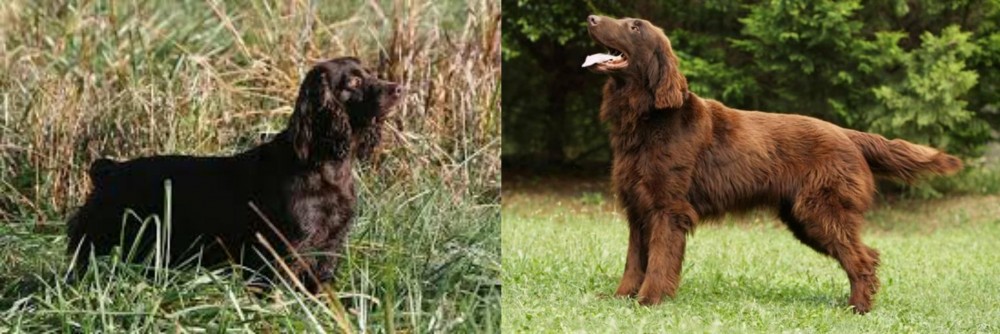 Boykin Spaniel is originated from United States but Flat-Coated Retriever is originated from United Kingdom. Boykin Spaniel may grow 15 cm / 5 inches shorter than Flat-Coated Retriever. Boykin Spaniel may weigh 18 kg / 39 pounds lesser than Flat-Coated Retriever. Boykin Spaniel may live 6 years more than Flat-Coated Retriever. Both Boykin Spaniel and Flat-Coated Retriever has almost same litter size. Both Boykin Spaniel and Flat-Coated Retriever requires Moderate Maintenance.
Boykin Spaniel is originated from United States but Flat-Coated Retriever is originated from United Kingdom. Boykin Spaniel may grow 15 cm / 5 inches shorter than Flat-Coated Retriever. Boykin Spaniel may weigh 18 kg / 39 pounds lesser than Flat-Coated Retriever. Boykin Spaniel may live 6 years more than Flat-Coated Retriever. Both Boykin Spaniel and Flat-Coated Retriever has almost same litter size. Both Boykin Spaniel and Flat-Coated Retriever requires Moderate Maintenance.
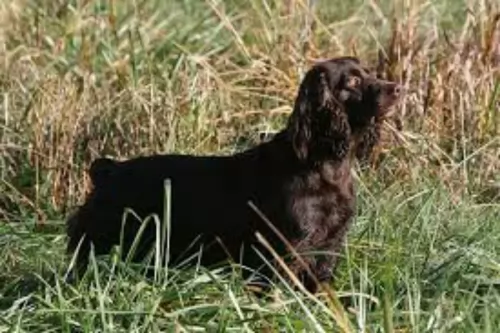 The Boykin Spaniel was originally bred by South Carolina hunters as the perfect dog for hunting wild bird during the early 1900s. Alexander White of Spartanburg found a short, well built dog and named him Dumpy. The dog was given to a certain L. Whitaker Boykin and a similar dog in looks was found and mated with Dumpy on Boykin’s Pine Grove plantation. Whitaker Boykin was particularly looking for a special kind of hunting dog breed that could wade into swamplands and into water.
The Boykin Spaniel was originally bred by South Carolina hunters as the perfect dog for hunting wild bird during the early 1900s. Alexander White of Spartanburg found a short, well built dog and named him Dumpy. The dog was given to a certain L. Whitaker Boykin and a similar dog in looks was found and mated with Dumpy on Boykin’s Pine Grove plantation. Whitaker Boykin was particularly looking for a special kind of hunting dog breed that could wade into swamplands and into water.
Boykin’s spaniels were popular in South Carolina before World War II and later, in 1977, the Boykin Spaniel Society was founded to ensure the breeding standards of the dog. In 1985, the Boykin Spaniel was declared the state dog of South Carolina and recognized by the American Kennel Club in 2009.
 The Flat-Coated Retriever traces its heritage to 19th century England. A popular gamekeepers’ dog, the actual descendants of the breed are not entirely known. Like so many well-established breeds, there are many lines of thought about the breed line. There is an unverified line of ancestry that includes the St. Johns Water Dog – an extinct breed from North America. Another story has Canadian sailors bringing their Newfoundlands to England and mixing them with Colliers and Setters. This story has more truth to it and it took 20 years to establish the final breed type.
The Flat-Coated Retriever traces its heritage to 19th century England. A popular gamekeepers’ dog, the actual descendants of the breed are not entirely known. Like so many well-established breeds, there are many lines of thought about the breed line. There is an unverified line of ancestry that includes the St. Johns Water Dog – an extinct breed from North America. Another story has Canadian sailors bringing their Newfoundlands to England and mixing them with Colliers and Setters. This story has more truth to it and it took 20 years to establish the final breed type.
The breed was originally a retriever with two purposes – to retrieve the hunters’ bounty on land and on water.
The Flat-Coated Retriever was then introduced to the United States as a gun dog. By 1873 it was a “stable type” and in 1915 the AKC recognized the breed. After this, their popularity grew quickly until the American public fell in love with the Golden Retriever and the Labrador Retriever. Then the Flat-Coated Retriever’s numbers and popularity fell. The irony was that both the Golden and the Labrador credited the Flat-Coated Retriever as an ancestor. The survival of the breed was questionable following World War Two. They were brought back by a specific breeding program in the 1960’s.
Breeders in the ‘60s made sure they bred for both show dogs and companion animals. The Flat-Coated Retriever survived and is less popular than other retrievers, but he has his fans. The breed is more popular in the United Kingdom than it is in the United States in part because of Best in Show wins at Crufts
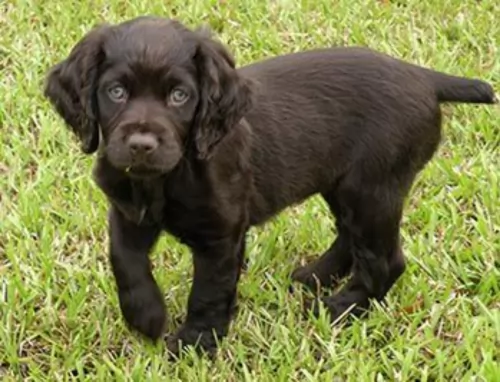 You can’t miss the medium-sized Boykin Spaniel with his magnificent coat in different shades of brown. When he gleams in the sun he looks like chocolate. This type of Spaniel is a bit bigger than the English Cocker Spaniel, but he is heavier, weighing between 13 to 18kg. He has large, floppy feathery ears and the tail has always been docked to give him that distinct look, but now with rules and regulations, the tail is often left so that it is long and feathery. The height of this dog at the withers is 39 to 43cm.
You can’t miss the medium-sized Boykin Spaniel with his magnificent coat in different shades of brown. When he gleams in the sun he looks like chocolate. This type of Spaniel is a bit bigger than the English Cocker Spaniel, but he is heavier, weighing between 13 to 18kg. He has large, floppy feathery ears and the tail has always been docked to give him that distinct look, but now with rules and regulations, the tail is often left so that it is long and feathery. The height of this dog at the withers is 39 to 43cm.
The length of the dog’s coat varies somewhat because of the different breeds from the past. Essentially the coat is medium length and wavy to curly with light feathering around the legs, ears, chest and stomach.
The Boykin Spaniel is social and he makes an excellent family pet. He is good around children and other dogs, and with training and socialization he becomes even more amicable and obedient.
 The Flat-Coated Retriever has a straight and strong topline with unique head, strong jaws, a long muzzle and small ears. His eyes are dark brown almonds with a friendly and intelligent expression. He has an arched neck and a moderately long tail. The Flat-Coated Retriever is more of an athlete, lighter and certainly more elegant than any other type or breed of retriever.
The Flat-Coated Retriever has a straight and strong topline with unique head, strong jaws, a long muzzle and small ears. His eyes are dark brown almonds with a friendly and intelligent expression. He has an arched neck and a moderately long tail. The Flat-Coated Retriever is more of an athlete, lighter and certainly more elegant than any other type or breed of retriever.
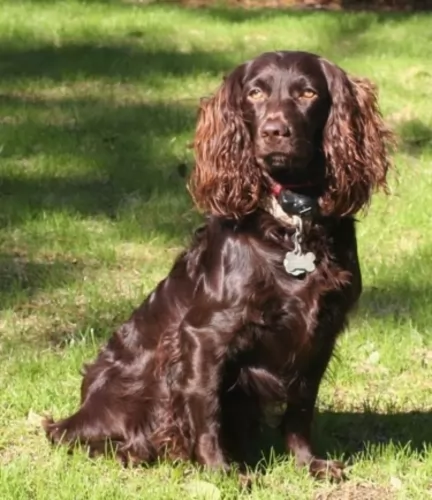 The Boykin Spaniel is a diverse breed. The characteristics of the dog aren’t set in stone. He is a hunting dogs with boundless energy and enthusiasm. He is an intelligent breed and responds well to training and is obedient to your commands. He is all about fun and excitement and he is guaranteed to make a splendid companion.
The Boykin Spaniel is a diverse breed. The characteristics of the dog aren’t set in stone. He is a hunting dogs with boundless energy and enthusiasm. He is an intelligent breed and responds well to training and is obedient to your commands. He is all about fun and excitement and he is guaranteed to make a splendid companion.
Active and social, he is going to need input from his owners in terms of exercise and mental stimulation. He isn’t a dog to just ignore and in exchange for love and care, he is going to be a loving, loyal and fun companion for you.
 The Flat-Coated Retriever is great with children. Just be careful they don’t knock over small children in their enthusiasm.
The Flat-Coated Retriever is great with children. Just be careful they don’t knock over small children in their enthusiasm.
They are confident great family dogs. They are “thinking dogs” and need something to work for or they will work for themselves. They can be clowns.
They are adaptable although their size might preclude small locations without yards.
Smart, thinking all the time, they are very trainable. However, they are considered the “Peter Pan” of dogs – they never grow up.
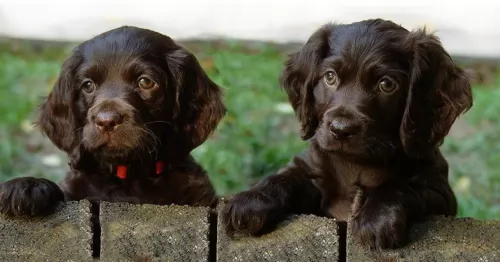 The Boykin Spaniel is a healthy breed with a life span of 14 to 16 years. There are some diseases that you want to be aware of with your Boykin Spaniel.
The Boykin Spaniel is a healthy breed with a life span of 14 to 16 years. There are some diseases that you want to be aware of with your Boykin Spaniel.
Always be aware of Hip Dysplasia as it can reduce your pet’s quality of life.. In dogs with hip dysplasia, the hip joint doesn’t to develop properly and deterioration sets in and your pet can lose function of the joint. You’ll notice your pet battling to stand up after lying down. The frightening this is that some dogs begin to show signs of hip dysplasia as early as 4 months of age.
The Boykin Spaniel’s most common health problems apart from hip dysplasia are patellar luxation and juvenile cataracts.
 Flat-Coated Retrievers have their share of health concerns from dysplasia to cancer. The breeds problems include:
Flat-Coated Retrievers have their share of health concerns from dysplasia to cancer. The breeds problems include:
Hemangiosarcoma, Osteosarcoma, Malignant Histiocytosis, and Fibrosarcoma. Studies show that about half of all Flat-Coated Retrievers die of cancer.
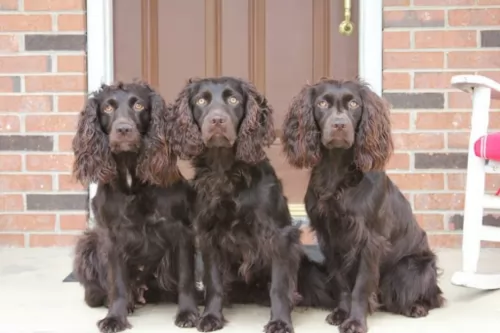 The Boykin Spaniel has been a gun dog and because he is energetic, he will need plenty of exercise and activities. Take him for walks or allow him to swim in the farm dam if you live in the country. He isn’t a dog to leave on his own in your backyard as he needs exercise as well as mental stimulation to keep him from becoming frustrated and developing destructive habits.
The Boykin Spaniel has been a gun dog and because he is energetic, he will need plenty of exercise and activities. Take him for walks or allow him to swim in the farm dam if you live in the country. He isn’t a dog to leave on his own in your backyard as he needs exercise as well as mental stimulation to keep him from becoming frustrated and developing destructive habits.
The Boykin’s hair will need to be brushed as least twice a week to prevent it from matting, particularly if he is a country-living dog, in and out of water and running through long grass. He is not a heavy shedder but his shedding is seasonal. As a long eared dog, he will need to have his ears checked to prevent infection.
Other grooming habits to get used to with your Boykin Spaniel are having his nails trimmed and brushing his teeth at least 2 or 3 times a week with special dog toothpaste and brush.
Boykin Spaniel owners who know the breed well say that there is nothing better than feeding your dog raw meat with vegetables and rice. Of course, not everyone can afford to feed their pets raw meat every day, and that’s alright. Just make sure that every now and then you include raw meat into your pet’s diet.
The very best commercially produced dog foods can also be good for your pet. If in doubt, speak to your veterinarian about the best food for your active, energetic pet. Never, ever deprive your pet of fresh, cool water throughout the day and night.
 He will be a medium size dog. Feed puppies 3-4 times a day about a 1/8 cup of high-quality food. Feed a puppy food designed for medium size dogs or specifically for retrievers.
He will be a medium size dog. Feed puppies 3-4 times a day about a 1/8 cup of high-quality food. Feed a puppy food designed for medium size dogs or specifically for retrievers.
Feed 2 times a day about !/2 cups of dry food per meal. Do not overfeed. They have a tendency to be obese.
Maintain a healthy weight and avoid exercise before and after meals. The good news is dysplasia and epilepsy are rare in the breed.
They are very energetic and need good exercise. Long walks and a yard to run in. Remember they are hunting dogs and will chase to retrieve things so don’t let them off leash outside your yard. They will excel at agility, tracking. Rally, obedience, swimming, hunting, and jogging. They make great therapy dogs.